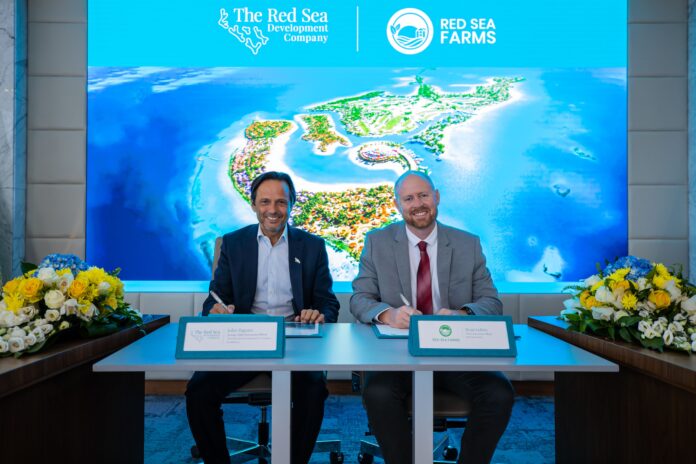RIYADH: Saudi Arabia’s sustaianble tourism developer, The Red Sea Development Co., signed an agreement with Red Sea Farms to establish a farm that will produce food using smart technologies, sun light, and sea water to supply the hotels it is buliding with sustainable food, it said today in a statement.
Red Sea Farms will build and operate the indoor farm, growing crops to sustainably feed guests and residents at The Red Sea Project. It will become a main supplier to the luxury destination’s resorts and restaurants, TRSDC said in a statement.
Instead of of relying on rainfall, fresh groundwater, or desalinated water, the farm will use sunlight and saltwater to cool greenhouses and grow crops. This saves up to 300 litres of fresh water per kilogram of produce – a 95 percent saving compared with other AgTech systems.
This means a reduced impact on the environment and a significant cost saving for growers. It also results in more nutritious crops, while also providing a richer taste, flavor and texture, the statement said.
The technology has been designed and developed in Saudi Arabia for use in often challenging environmental conditions, according to the statement.
“At TRSDC we believe in embracing new innovations to solve the challenges we face as we attempt to improve our relationship with the environment. Red Sea Farms’ technology is novel, exciting and has the possibility of helping to tackle food scarcity globally. This partnership means we’re meeting our own sustainable and regenerative ambitions, and once again demonstrating to the wider industry that tourism development can be done in a more considerate and responsible way,” said John Pagano, CEO of TRSDC.
Ryan Lefers, CEO at Red Sea Farms, said: “We are committed to tackling one of the world’s greatest challenges: food security. That challenge can only be overcome through collaborative efforts between like-minded companies. TRSDC not only shares our sustainability ethos, it also understands the great challenge diminishing resources will play in the future. Our ambition is to use Red Sea Farms’ technology to feed the world sustainably and this partnership moves us to the next stage of making that a genuine possibility.”
This is the first time an agreement has been reached to roll out the technology on such a large scale in Saudi Arabia and makes TRSDC the first organization to recognize its commercial potential.
By 2023, The Red Sea Project will welcome 300,000 guests annually and upwards of 14,000 employees and once fully operational in 2030, up to one million guests per year and home to around 35,000 employees. Feeding this many people in a remote, largely desert environment presents huge logistical challenges.
By working with Red Sea Farms, TRSDC is developing a self-sustaining and ecologically friendly food supply, which will be built within TRSDC’s wider sustainable food park zone.
TRSDC has set aside a 50 square hectare food development area and is inviting leading companies from around the world to set up production facilities as well as pilots of cutting-edge food technologies that can someday be used on a commercial scale.
The Red Sea Farms indoor farm will produce a diverse range of fresh leafy greens, herbs, vine crops, fruit including berries; and vegetables. Following the pilot, Red Sea Farms will have the option of expanding the farm to up to 100 hectares in the future, which would make it the largest sustainable farm of its kind in the world.
The Red Sea Project will welcome its first guests by the end of 2022. The first phase of the development, set to complete in 2023, includes 16 luxury hotels offering 3,000 keys across five islands and two inland locations. It will also include entertainment facilities, and the necessary supporting logistics and utilities infrastructure.
Upon completion in 2030, The Red Sea Project will comprise 50 hotels, offering up to 8,000 hotel rooms and around 1,300 residential properties across 22 islands and six inland sites.

